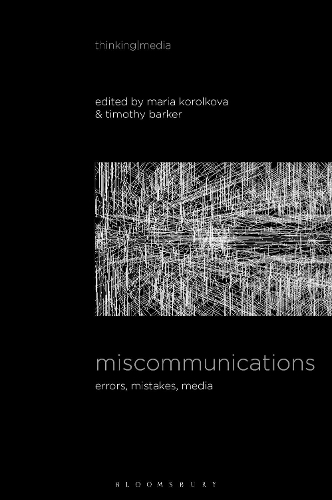
Miscommunications: Errors, Mistakes, Media
(Hardback)
Available Formats
Publishing Details
Miscommunications: Errors, Mistakes, Media
By (Author) Dr Timothy Barker
Edited by Dr Maria Korolkova
Bloomsbury Publishing PLC
Bloomsbury Academic USA
14th January 2021
14th January 2021
United States
Classifications
Tertiary Education
Non Fiction
Media, entertainment, information and communication industries
Communication studies
302.2
Physical Properties
Hardback
344
Width 140mm, Height 216mm
544g
Description
What happens when communication breaks down Is it the condition for mistakes and errors that is characteristic of digital culture And if mistakes and errors have a certain power, what stands behind it To address these questions, this collection assembles a range of cutting-edge philosophical, socio-political, art historical and media theoretical inquiries that address contemporary culture as a terrain of miscommunication. If the period since the industrial revolution can be thought of as marked by the realisation of the possibilities for global communication, in terms of the telephone, telegraph, television, and finally the internet, Miscommunications shows that to think about the contemporary historical moment, a new history and theory of these devices needs to be written, one which illustrates the emergence of the current cultures of miscommunication and the powers of the false. The essays in the book chart the new conditions for discourse in the 21st century and collectively show how studies of communication can be refigured when we focus on the capacity for errors, accidents, mistakes, malfunctions and both intentional and non-intentional miscommunications.
Reviews
In the so-called post-truth age it is important to critically reflect on the construction, or constructedness, of any type of communication, from human dialogues to news reporting, from fictional media forms to electronic signals, from artistic practices to computer algorithms. With respect to the current waves of fake news, new academic research about miscommunication and misinformation is not only welcome, but also urgently needed. It is especially essential to distinguish between communication and information, or even better, to rethink communication as a process of (mis)information transfer, as an action of human and non-human actors, each with their own intentions, inattentions, imperfections, material qualities, etc. In order to grasp the complexity of this topical subject, it is crucial to adopt a combined media technological, media philosophical and media historical approach. This is precisely what the volume Miscommunication: Errors, Mistakes and the Media, edited by Maria Korolkova and Timothy Barker, is offering. * Wanda Strauven, Adjunct Professor, Institute of Theater, Film and Media Studies, Goethe University, Germany *
Miscommunications promises to turn media studies and media theory inside out, by taking seriously the ways in which glitches, noise, and distortion do not just interfere with the transmission of messages, but actually contribute to such messages by transforming their meanings. * Steven Shaviro, DeRoy Professor of English, Wayne State University, USA *
Author Bio
Maria Korolkova is a senior lecturer in media and film studies and academic portfolio lead in media at the University of Greenwich, UK, specialising in visual culture, intermediality, film, architecture, cultural theory, and Russian culture. In her research, Maria explores themes of miscommunication and chaos, global media, visual and sonic cultures, as well as the relationship between film and architecture. Maria has curated public events in internationally renowned institutions such as The Barbican, Courtauld Institute of Arts, Regents Street Cinema, London, Centre Pompidou, Paris, and others. Timothy Barker is a senior lecturer in digital media and the head of Film and Television Studies at the University of Glasgow, UK. He is the author of two books, Time and the Digital (2012) and Against Transmission (Bloomsbury, 2017), both of which outline a media philosophical approach for addressing questions of time and mediation in the contemporary world. His broad research interests include digital media theory, philosophies of technology, game studies and process philosophy.
